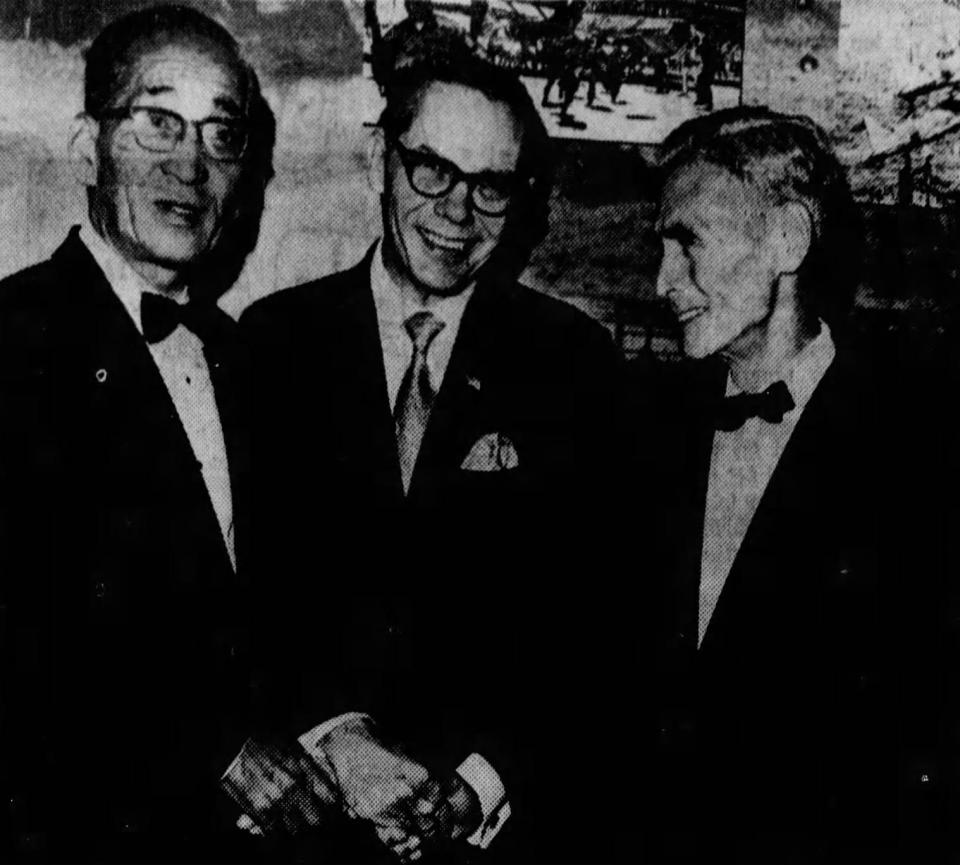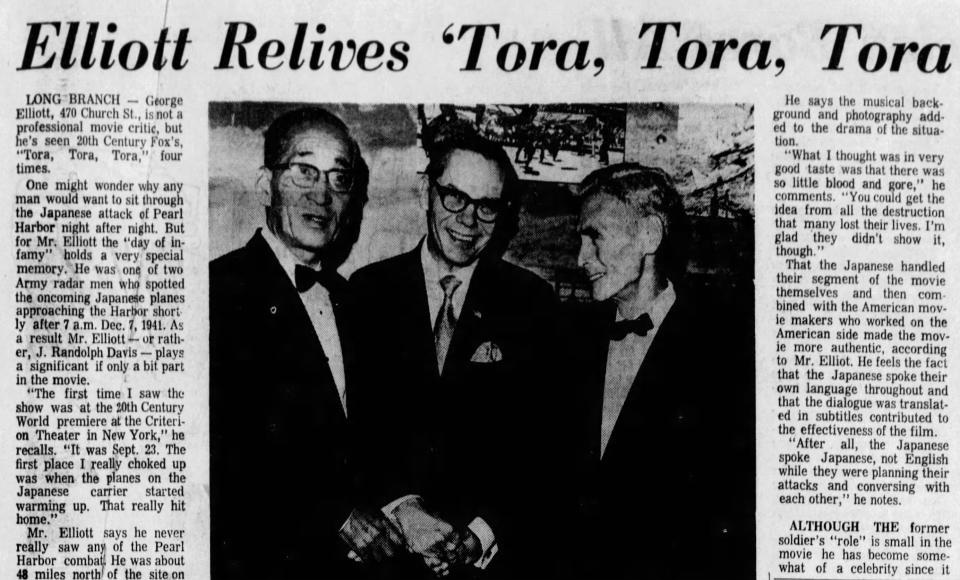'I saw the blip': Radar operator's Pearl Harbor warning was ignored
On the morning of Dec. 7, 1941, George Elliott Jr. was a 23-year-old Army private learning how to master state-of-the-art radar equipment in Hawaii.
He and fellow private Joseph Lockard were supposed to close the station at 7 a.m. sharp — the newfangled technology was only being used on a limited basis at the time — but they lingered a bit longer to familiarize themselves with the system.
“It was then that I saw the blip,” Elliott told the Asbury Park Press, part of the USA TODAY Network, in 1970, “and didn’t know what to make of it.”
That blip? Elliott was the first American to spot the impending Japanese attack on Pearl Harbor. As he told the Press in 1970, he called an administrative office to report the unusual finding and was told by an officer there, Lt. Kermit Tyler, to forget about it.

Pearl Harbor Remembrance Day: Historical photos show the Dec. 7, 1941 attack in Hawaii
The subsequent surprise attack commenced 50 minutes later and killed 2,403 Americans, destroyed or damaged 19 U.S. Navy ships, and sparked America’s entry into World War II.
Elliott died 20 years ago this month at age 85. His story is worth remembering on Pearl Harbor Day.
“At this point in time, people didn’t trust radar,” Monmouth County, New Jersey, historian John Barrows said. “From that point forward, there wasn’t any major radar thing that happened that wasn’t taken seriously. That’s an incredibly important thing.”
Dec. 7, 1941: America remembers devastating attack on Pearl Harbor
Nearly written out of history
Barrows has done meticulous research on the subject for his website This Day in Monmouth County History. As he notes, there were differing accounts through the years about which private did what in that radar station.
“In the aftermath of the attack, (Lockard) was given almost complete credit for spotting and reporting the approaching Japanese aircraft,” Barrows wrote. “ He was promoted to sergeant and sent to Officer Candidate School and awarded the Distinguished Service Medal.”
Barrows added, “George Elliott is disregarded entirely in Joe Lockard’s commendation.”
In “December 7th,” a 1943 film about Pearl Harbor directed by the Hollywood legend John Ford, “there’s Joe Lockard, all by himself” in the radar station, Barrows said.
After the war, on the verge of being written out of history, Elliott reported to Fort Monmouth, where the first aircraft detection radar in the U.S. had been developed. Then, in 1946, he testified at a Congressional hearing about Pearl Harbor.
What is Pearl Harbor Remembrance Day? What to know about 1941 attack that sent US into WWII
“After his testimony, and lobbying from senators, the Army awarded Elliott the Legion of Merit for his actions on that day, but he refused to accept the honor, saying he should not be given a lesser recognition than Lockard,” Barrows wrote. “Years later, he said that he had refused the honor because they were just doing their jobs, looking at screens, and that it might be different if lives had been saved.”
Elliott settled down in Long Branch, where he lived for 33 years and worked for New Jersey Bell Telephone.
“He was known throughout the community and gave talks at schools about Pearl Harbor,” Barrows said.
In 1970 Elliott seized on an opportunity to — as far as he was concerned — set the record straight once and for all.
'Let's face it, we were stupid'
Nearly three decades after Pearl Harbor, the film “Tora! Tora! Tora!” sought to tell the unvarnished story about what happened on the day of infamy. It’s widely viewed as a fair depiction of what took place, and you know who was an uncredited technical advisor?

George Elliott Jr.
So it should come as no surprise that in the radar scene, Elliott takes center stage.
“In this version, it’s Elliott who spots the planes, insists on making the call, places the one and only call, while Lockard is passive and somewhat uninterested,” Barrows wrote. “This movie clearly positions George Elliott as the hero of this situation, and not Lockard.”
Finally identified: NJ soldier killed at Pearl Harbor finally comes home
No matter which version is correct, Barrows said, “those two operated the system flawlessly. They did exactly what they were supposed to do.”
In his 1970 interview with the Asbury Park Press, Elliott said he saw “Tora! Tora! Tora!” four times in the theater. The first time, he said, “I really choked up when the planes on the Japanese carrier started warming up.”
The movie spotlights mistakes leading up to the tragedy, and Elliott — who was involved in one of the biggest — was OK with that.
“I don’t think the movie is anti-American, although it makes us look stupid,” he told the Press. “Let’s face it, we were stupid, Disregarding our alert wasn’t the only mistake the Americans made.”
Would the battle have turned out differently if his call was heeded? We’ll never know, but George Elliott took his disappointment to the grave. As his obituary read: “He is known for his early detection of the Japanese planes prior to the attack on Pearl Harbor Dec. 7, 1941. His three warnings were ignored by the upper echelon of the Army.”
Jerry Carino is community columnist for the Asbury Park Press, focusing on the Jersey Shore’s interesting people, inspiring stories and pressing issues. Contact him at jcarino@gannettnj.com.
This article originally appeared on Asbury Park Press: Pearl Harbor attack: NJ man tried to sound the alarm

